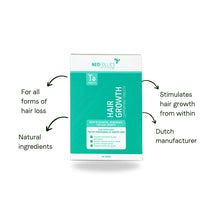Hair loss after pregnancy
Hormone fluctuations have an effect on hair growth. In a situation of normal hair growth, about 90 percent is actively growing. There are 3 phases of hair growth:
- The growth phase, called the anagen phase, lasts from two to seven years, but the average is about three years.
- The catagen phase is the transitional phase between the growth and rest phases. During this phase, the hair follicle retracts and detaches itself from the subcutaneous layer. On average, this phase lasts one to two weeks.
- The rest of the hair is in the telogen phase. In other words, it is not growing actively and is in the resting phase. With a healthy scalp, this phase lasts three to five months.
Hair loss during pregnancy
The oestrogen level increases enormously during pregnancy. For some women, this means that more hair enters the growth phase (up to 95%), making their hair fuller. For other women, the increase means that hair passes more quickly from the growth phase to the resting phase. During this time, you may experience reduced growth and more hair loss.
Stress, overtiredness and tension can also be a factor in hair loss. And what exactly is an exhausting and stressful period? Indeed, pregnancy. As the body is under extra strain due to stress (and pregnancy), nutrients are often less well absorbed or passed on to the hair roots. This is a difficult period, which you do not want to see aggravated by hair loss. So, it is understandable to look for a solution. What is in any case important and reassuring is that hair loss during pregnancy is in most cases temporary.
Can you do something for hair loss during pregnancy?
Do you want to do something about hair loss during pregnancy? Then you can, but it is better to wait until your pregnancy is over. This is because many hair growth remedies have an effect on hormonal balance, which is precisely the reason for this type of hair loss. You don't want to add to this.
However, during pregnancy you can use products that strengthen your hair and improve the overall condition of your scalp. Consider a hair-thickening shampoo and conditioner that you can use daily, such as Beaver's.

Hair loss after pregnancy
Hair loss during pregnancy is not common, but after childbirth, many women experience a difference. The significantly increased oestrogen level drops temporarily and even becomes lower than before pregnancy. A larger proportion of hair now enters the resting phase (telogen phase). This form of hair loss is called telogen effluvium. In addition, the aforementioned stress associated with childbirth as well as a possible iron deficiency can contribute to accelerated hair loss and recession after pregnancy. Iron deficiency often occurs during pregnancy or breastfeeding.
When does hair loss start after pregnancy?
After childbirth, hair loss usually starts to occur about three months later, which often comes as a surprise to new mothers. However, exactly when this starts varies from woman to woman. During this period, you may face an increase in hair loss, which can vary in duration and intensity. The amount of hair that falls out and the duration of hair loss all depend on how quickly your hormones rebalance after childbirth. Fortunately, your usual head of hair usually returns over time. Some women may barely notice this hair loss, while others may be more affected.
What can you do about hair loss after pregnancy (post-partum)?
After pregnancy, there are many things you can do to combat hair loss. However, with regard to breastfeeding, treatments that affect hormones are not recommended during this period. We therefore advise against using products such as minoxidil or nanoxidil.
American research has also pointed out that some regular hair care products can have a negative effect on pregnancy. These include shampoos containing parabens or phthalates.
This is why we have put together a package of products that do suit women who want to do something about their hair loss immediately after pregnancy and/or while breastfeeding. This way, you can give your hair growth an extra boost and you will have your desired, full head of hair back faster.
Treatment for hair loss after pregnancy
This treatment contains five specially selected products that can help combat the process of hair loss after pregnancy:
- Anacaps Tri-Activ capsules: this supplement provides hair roots with essential nutrients such as vitamins B6, B8, E, PP and iron. These ingredients help make hair strong and vibrant, which is essential for recovery after hair loss.
- Creastim Reactiv lotion: This lotion is formulated with specific active ingredients that stimulate hair growth. It contains vitamins B, especially biotin, which promote the synthesis of keratin. Keratin is an important protein for hair structure, making the hair stronger and more resilient.
- Beaver keratin shampoo and conditioner: these products contain hydrolysed keratin, which penetrates deep into the hair to repair damaged parts. They help strengthen hair fibre, reduce breakage and improve overall hair structure, contributing to a healthier appearance.
- MSM powder: MSM (Methylsulfonylmethane) is a natural sulphur compound that contributes to the production of keratin and collagen. It supports skin and hair health, promotes hair growth and can help reduce hair loss by strengthening hair follicles.














